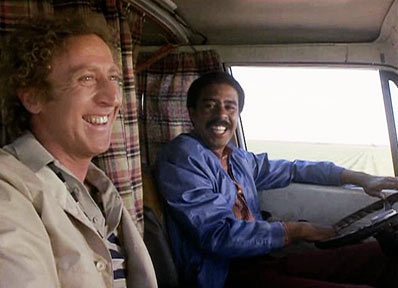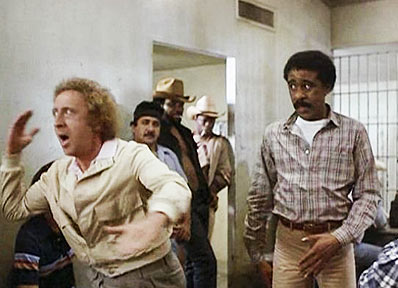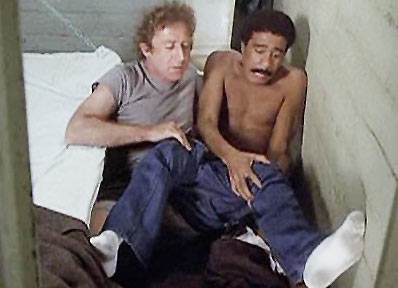Don’t Give Up: Go Stir Crazy
Published on November 29th, 2010 in: Comedy, Issues, Movie Reviews, Movies, Retrovirus, Three Of A Perfect Pair |By Jemiah Jefferson
“I only have one speed: balls out.”
One of the essential films of my childhood was released in 1980, and I am almost completely certain that I saw it in the theater, being an avid fan of both Richard Pryor and Gene Wilder by the age of eight. Besides hearing Pryor’s comedy albums, I had also been lucky enough to catch Silver Streak on late-night TV as a wee one, and I most absolutely had seen The Wiz in the theater, and loved the hell out of it. And I am fairly certain I came out of the womb as a fan of Gene Wilder; no one can prove otherwise.

Stir Crazy features dozens of iconic moments that helped to crystallize what I understood as comedy, providing slapstick without pandering, melodramatic emotions writ small enough to recognize, and above all, the true art of Silly. I do enjoy Mean Humor, and definitely Dark Humor, but Silly is actually the hardest to really get right. Fortunately, Stir Crazy gives us Pryor and Wilder at the top of their respective games, before addiction, disease, and grief took their toll.
Written by Bruce Jay Fieldman, the man also responsible for Splash, Doctor Detroit, and the mostly-forgotten Steve Martin vehicle The Lonely Guy, the script keeps things flowing, but something tells me that most of the best “text” in this movie doesn’t come from words. Ably directed by Sidney Poitier, the smartest course of action was to let Pryor and Wilder spaz out so completely they would reach a different plane.
As many a 1980 film did, Stir Crazy opens on scenes of stereotypical wintertime New York—nasty attitudes, combativeness, gross people, grosser people, snow. In the midst of this urban misery, Richard Pryor is Harry, an actor working his day job as a waiter at a home full of nice, rich, white people. The good-natured, if highly strung, Harry gets briefly caught up in a comedy of 1970s manners when his stash of weed is mistaken for oregano by a thoughtless cook and liberally fed to the nice, rich, white people. “Jesus!” he bleats indignantly, “You cooked half ma stash!”
Meanwhile, Gene Wilder, as Skip, a terribly earnest, unsuccessful playwright doing a bad job as a department-store detective, totally fails to charm a young, salty-tongued actress in a department store as he simultaneously praises her performance and accuses her of shoplifting. He giggles uncontrollably, which helps his case not at all, but sneaks him into our hearts without our notice.

They both get fired without much ado and decide to head out west to make their fortunes in fantasy California. Their rusted-out old Ford bus breaks down in a town in the middle of nowhere, and the repair bill takes most of their money. Harry is somewhat freaked to be stuck in a town full of combative quasi-rednecks, but Skip, in his cluelessly good-hearted way, thinks the place is great, and immediately cooks up a scheme to earn some of their money back: singing a jingle while dancing around in woodpecker costumes as a promo idea for the local bank. Naturally, a couple of bank robbers steal the costumes, and suited-up, return to the bank for some stealing and mayhem. The town rednecks immediately arrest Skip and Harry, they get thrown into prison on a sentence of 125 years, and Stir Crazy finally truly begins.
The movie’s only directed with minimum competence—music cues don’t overlap visual edits; everything looks cheap, dingy, and shoddy—but when you have stars like Pryor and Wilder, fancy stuff would just get in the way. All that’s needed is to wind up Richard and let him rant until he slaloms wildly between Baptist-preacher hysteria and sobbing, broken vulnerability, and all of it is pants-wettingly funny. Match that with Gene Wilder’s own legendary flights of mania, and you get a comedy team for the ages.
Great supporting characters help this movie, too. Esteemed actor Georg Stanford Brown plays Rory, a very queeny gentleman doing time for killing his stepfather for “criticizing [his] new fur jacket,” then takes a shine to Harry and provides much-needed prison survival information. Grossberger, the massive, silent Tor Johnson analogue, has a marvelous character arc. Here’s a bit of trivia: the guy who played him, Erland van Lidth, was a graduate of MIT and yes, genuinely an opera singer. Previous axe-murder record holder Blade (helmet-afroed Charles Weldon) gets one of the best monologues of all cinema history when he patiently explains to Harry the truth about being a rodeo clown. (Richard Pryor’s mostly wordless responses to this missive are priceless.)
JoBeth Williams and Craig T. Nelson team up years before Poltergeist. JoBeth is there to remind us of Skip’s heterosexuality, no matter how touchy-feely he gets with Harry, and to underscore that when Gene Wilder turns the big-blue-eyed charm on, it’s dreamy in the extreme. (The scene where she first comes to see him in jail to talk about the potential appeal is unfiltered Wilder genius, from nutty to razor-sharp to seductive to disappointed bathos, all in the course of maybe forty-five seconds.) Craig T. Nelson plays Deputy Wilson, the befuddled foil of head warden Beatty, played with countrified brio by go-to Texan Barry Corbin, who sees in the bull-riding savant Skip a chance to win big at the annual prison rodeo. Gathering this ensemble for the annual prison rodeo, during which our heroes make a last play for justice and freedom in the form of an elaborate jailbreak, brings the movie to a rousing, engaging climax.

Sure, Stir Crazy doesn’t make a great deal of sense and has only a glancing relationship with reality (at times, it does make prison look a lot like sleepaway camp), but who cares? If the pace occasionally drags—showing signs of switching to the script and away from the beautifully psychotic improv of Wilder and Pryor—sit tight; more silliness is on its way. There’s barely a message to be unearthed besides “When in desperation and doubt, act like a complete nutjob,” or maybe, “Don’t give up; go crazy instead.”
Time limit is exhausted. Please reload the CAPTCHA.